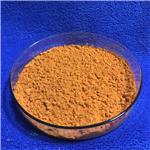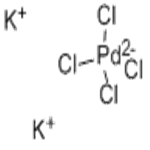
Potassium chloropalladite
- Product NamePotassium chloropalladite
- CAS10025-98-6
- MFCl4K2Pd
- MW326.43
- EINECS233-049-3
- MOL File10025-98-6.mol
Chemical Properties
| Melting point | 105 °C (dec.)(lit.) |
| Density | 2.67 g/mL at 25 °C(lit.) |
| storage temp. | Inert atmosphere,Room Temperature |
| form | Crystals or Crystalline Powder |
| Specific Gravity | 2.67 |
| color | Red-brown |
| Water Solubility | SOLUBLE |
| Sensitive | Hygroscopic |
| Stability | Stable. Incompatible with strong oxidizing agents. |
| InChI | InChI=1S/4ClH.2K.Pd/h4*1H;;;/q;;;;2*+1;+2/p-4 |
| InChIKey | LGCKLDWLSVFMGL-UHFFFAOYSA-J |
| SMILES | [Pd-2](Cl)(Cl)(Cl)Cl.[K+].[K+] |
| CAS DataBase Reference | 10025-98-6(CAS DataBase Reference) |
| EPA Substance Registry System | Palladate(2-), tetrachloro-, potassium (1:2), (SP-4-1)- (10025-98-6) |
Safety Information
| Hazard Codes | Xi |
| Risk Statements | 36/37/38-36/38 |
| Safety Statements | 26-36-37/39 |
| WGK Germany | 3 |
| RTECS | TT4100000 |
| TSCA | TSCA listed |
| HS Code | 28429080 |
| Storage Class | 11 - Combustible Solids |
| Hazard Classifications | Eye Irrit. 2 Skin Irrit. 2 STOT SE 3 |


